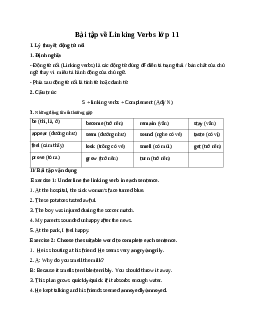


Preview text:
Tiếng Anh 11 Global Success Unit 3 Listening Living in a smart city
(Việc sống trong thành phố thông minh)
1. Match the words and phrases with their meanings.
(Nối các từ và cụm từ với ý nghĩa của chúng.) Gợi ý đáp án 1. c 2. d 3. b 4. a
2. Listen to an interview and choose the correct answers A, B, or C.
(Nghe một cuộc phỏng vấn và chọn câu trả lời đúng A, B, hoặc C.) Gợi ý đáp án 1. B 2. A 3. A Nội dung bài nghe
Host: Good morning. Welcome to our weekly programme Urban Lifestyle. In today’s
programme, we’ll be talking about the disadvantages of living in a smart city. Joining me
now in the studio is Ms. Stevens, a city dweller who has been living in a smart city for a
year now. Good morning, Ms. Stevens. Ms Stevens: Good morning.
Host: I understand that you don't like living in the smart city. Why is that? What are you worried about most?
Ms Stevens: Well, my main worry is losing my right to privacy in public places. You
know, cameras and sensors are everywhere, and they collect information about me and my activities.
Host: So it seems that someone is watching you all the time, right?
Ms. Stevens: Exactly. The government and some companies have so much personal
information about city dwellers, but we don't know how they might use it.
Host: Yes, it's a bit worrying, but this information probably enables smart cities to create
useful programmes and improve people's lives. Smart technologies can also help with
daily household chores. Are you not happy with that?
Ms. Stevens: No, I don't think so. It took me a long time to get familiar with all the smart
devices at home. I don't really have any friends to ask for help in the neighbourhood.
Host: This leads me to my next question. Do you think there is a sense of community in your neighbourhood?
Ms. Stevens: No, there isn’t. I interact with very few people face to face because most of
the activities can be done online.
Host: Do you feel lonely sometimes?
Ms Stevens: Yes, our smart devices are all connected, but it seems we're becoming
lonelier than any previous generation.
Host: That's very sad. Thank you for sharing your thoughts with us. Ms Stevens. Ms Stevens: You're welcome.
3. Listen to the interview again and complete the table. Use no more than THREE words for each answer.
(Nghe lại cuộc phỏng vấn và hoàn thành bảng. Sử dụng không quá BA từ cho mỗi câu trả lời.) Gợi ý đáp án 1. right to privacy 2. smart technologies 3. interact 4. sense of community
4. Work in groups. Discuss the following questions.
(Làm việc nhóm. Thảo luận các câu hỏi sau.)
Do you agree with Ms Stevens? Which of the disadvantages she mentioned do you
think is the most serious? Why?
(Bạn có đồng ý với cô Stevens không? Bạn nghĩ nhược điểm nào trong số những nhược
điểm mà cô ấy đề cập là nghiêm trọng nhất? Tại sao?) Gợi ý đáp án Đang cập nhật




